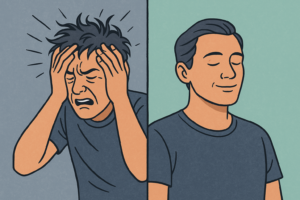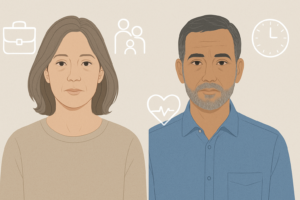Midlife Crisis: The Silent Mental Struggle No One Talks About

The Age of Doubt: Coping with Midlife Confusion and Change
We talk a lot about the turbulence of youth and the struggles of old age. But sandwiched between these two stages lies a phase that rarely gets the attention it deserves—the midlife crisis. It’s a period of internal chaos, quiet dissatisfaction, and profound self-questioning. And despite its widespread occurrence, it remains one of the most misunderstood and least discussed psychological phases of life.
In this article, we’ll explore what a midlife crisis is, what causes it, how it affects different individuals, and most importantly, how to cope. If you’ve ever felt stuck, restless, or deeply unfulfilled in your 30s, 40s, or early 50s, this might be the mirror you didn’t know you needed.
What Exactly Is a Midlife Crisis?
Coined in the 1960s by psychoanalyst Elliott Jaques, the term “midlife crisis” describes a psychological and emotional transition experienced between the ages of 35 and 55. During this time, many people start confronting their mortality, reevaluating life choices, and questioning the meaning of their accomplishments—or lack thereof.
Unlike clinical disorders that have diagnostic criteria, a midlife crisis is more of an emotional experience or existential reckoning. It’s not always visible to others, but it can feel all-consuming to the person going through it. This phase often surfaces quietly, triggered by internal and external life changes such as aging parents, children leaving home, career stagnation, or a decline in physical vitality.
Common Symptoms of a Midlife Crisis:
- Persistent boredom or a sense of meaninglessness, even when life seems “stable” from the outside.
- A sudden urge for drastic change, such as switching careers, ending relationships, or moving to a new city.
- Heightened anxiety about aging, including appearance, physical decline, and health concerns.
- Regret or guilt over past choices, such as missed career goals, lost passions, or strained relationships.
- Mood swings ranging from irritability and anger to sadness, restlessness, or even impulsive behavior like risky spending or extramarital affairs.
It’s important to note that not everyone experiences a midlife crisis, and even those who do may feel it at different intensities. For some, it’s a low hum of dissatisfaction; for others, it can be a mental storm that disrupts their relationships, self-esteem, and daily functioning.

The Silent Struggle: Why No One Talks About It
One of the most confusing parts of a midlife crisis is how quietly it unfolds. People rarely talk about it—even though it affects so many. While issues like depression, anxiety, or burnout are increasingly discussed in public and private conversations, the midlife crisis remains in the shadows. Many dismiss it as a temporary phase, or worse, a “privileged person’s problem.”
But for those going through it, the struggle is very real.
Why the Silence?
1. Social Expectations:
By your 40s or 50s, society expects you to be settled—successful in your career, raising a family, managing finances, and offering wisdom to others. Admitting that you’re confused, dissatisfied, or emotionally lost feels like breaking an unwritten rule. Many keep their feelings inside to maintain the image of stability.
2. Shame and Guilt:
People going through a midlife crisis often feel guilty for being unhappy. After all, they may have achieved the very things they once dreamed of—a steady job, a home, children. So why the emptiness? This conflict leads to shame, making it harder to open up. They worry others will see them as ungrateful, selfish, or even weak.
3. Lack of Words:
There’s no simple way to describe what a midlife crisis really feels like. It’s not just sadness or stress—it’s a deeper, nagging feeling of disconnection from yourself. Terms like “burnout” or “frustration” fall short. And without the right words, people often stay silent.
4. Generational Mindset:
Older generations, especially in cultures like Bangladesh, may dismiss this emotional turmoil as indulgent. Phrases like “We didn’t have time to feel lost” or “You have everything—what more do you want?” are common. This invalidates the experience and discourages honest conversation.
As a result, many people battle this invisible crisis alone—while pretending everything is fine on the outside.

The Psychology Behind a Midlife Crisis
A midlife crisis isn’t just about age—it’s about identity. By the time people reach their late 30s to 50s, many have built steady routines: jobs, families, social roles. But over time, these routines can start to feel restrictive. The energy and ambition of youth may fade, replaced by responsibilities, pressure, and a growing sense that time is running out.
For some, this stage brings quiet reflection. For others, it triggers intense emotional unrest.
Key Psychological Triggers:
1. Fear of Aging and Death:
One of the most powerful triggers is the realization that youth is over, and the second half of life has begun. Physical changes—like graying hair, wrinkles, or fatigue—act as daily reminders. For many, this sparks anxiety. Questions like “What have I really done with my life?” or “How much time do I have left?” can feel overwhelming.
2. Unmet Expectations:
By midlife, people begin to look back. If their current life doesn’t match the dreams they had in their 20s or 30s, it can lead to regret. Maybe a dream career never happened. Maybe a passion was put aside for survival. The gap between what is and what could have been can be painful.
3. Major Life Transitions:
Midlife often brings big changes—children leaving home the death or illness of parents, divorce, or job loss. Even positive changes, like retirement or financial success, can stir confusion about what to do next. These shifts disrupt the rhythm of life and force people to re-evaluate their identity and purpose.
4. Loss of Purpose:
Many people define themselves by their roles—as parents, workers, or caregivers. But what happens when children grow up, or when a job becomes stale or ends? Without clear goals or a sense of direction, some people feel empty, drifting, or emotionally stuck.
In short, a midlife crisis is a psychological reckoning—a moment when your past, present, and future collide. It can be painful, but it can also be the start of meaningful change, if handled with awareness and care.
Gendered Experiences of the Midlife Crisis
Men and women often experience midlife crises differently due to both biological and societal factors.
Men: Success vs. Significance
Men in midlife may become obsessed with external achievements—money, status, recognition. When they feel they’ve failed or plateaued, it can lead to impulsive decisions like quitting jobs, buying expensive items, or starting new relationships.
Common thoughts:
- “What have I really achieved?”
- “Is this all there is?”
- “I want to feel alive again.”
Women: Identity and Self-Worth
Women often experience a midlife crisis after years of caregiving or putting others first. As children grow up and hormonal changes begin (perimenopause or menopause), women may feel invisible, unfulfilled, or unsure of their identity outside their roles as mothers or partners.
Common thoughts:
- “Who am I now?”
- “Have I missed my chance?”
- “I want something that’s mine.”

Signs You Might Be Going Through a Midlife Crisis
A midlife crisis doesn’t always come with big, dramatic changes like quitting your job overnight or buying an expensive sports car. For many people, it unfolds slowly—like a fog that gradually settles in. You might still go to work, care for your family, and keep up appearances, all while silently struggling with thoughts you don’t fully understand.
Here are some subtle and clear signs that you may be experiencing a midlife crisis:
1. You Feel Disconnected from Your Own Life
It’s like you’re on autopilot. You go through your daily routine—eat, work, sleep—but nothing feels truly meaningful. You might feel like a stranger in your own life, as if you’re watching yourself from the outside.
2. You Constantly Compare Your Life to Others’
Scrolling through social media becomes painful. You look at others’ achievements, vacations, or seemingly perfect families and wonder, “Why am I not there yet?” Even friends’ successes might feel like reminders of your own “missed chances.”
3. You Fantasize About Escaping Your Current Reality
You catch yourself daydreaming about starting over—maybe in a different city, a new job, or even with a new partner. While it’s normal to wonder “what if,” frequent fantasies of escape may signal deep dissatisfaction with your present.
4. You Feel Jealous of Younger People’s Opportunities
Seeing someone in their 20s or early 30s starting fresh, making bold moves, or pursuing dreams might stir envy. You may think, “If only I had another chance,” or “It’s too late for me now.”
5. You’re Restless but Don’t Know What You Want
You feel an urge to change something—anything—but you’re unsure what that “something” is. This restlessness can lead to impulsive decisions or a sense of emotional chaos.
6. You Question the Value of Your Relationships or Career
You might look at your marriage or long-term partnership and wonder, “Am I really happy?” Or you might look at your job—even if it’s stable and well-paying—and think, “Is this all there is?” These doubts can shake the foundation of your identity.
The Link Between Midlife Crisis and Mental Health
Unaddressed, a midlife crisis can evolve into more serious mental health issues:
1. Depression
Midlife depression doesn’t always show up as extreme sadness. Sometimes it feels like emotional numbness or a loss of interest in things you once enjoyed. You might have trouble sleeping, feel tired all the time, or struggle with low self-worth. Thoughts like “I’ve wasted my life” or “What’s the point?” are red flags that shouldn’t be ignored.
2. Anxiety Disorders
The uncertainty of midlife—aging, changing relationships, financial stress—can trigger chronic worry. You might overthink everything, from your health to your career, and experience symptoms like a racing heart, restlessness, or panic attacks. This kind of anxiety can be exhausting and may interfere with daily life.
3. Substance Abuse
Some people turn to alcohol, smoking, or even prescription drugs as a way to “numb the pain” or cope with the emotional emptiness of midlife. What starts as occasional drinking to relax can quietly develop into dependency. This not only worsens mental health but also affects physical health and relationships.
4. Relationship Breakdowns
Unresolved midlife stress can strain even the strongest relationships. You may become emotionally distant from your partner, lash out at loved ones, or seek validation outside the relationship—leading to conflict, infidelity, or even divorce. Family dynamics may also suffer if emotional needs are not communicated.
Coping with a Midlife Crisis: A Guide to Healing
The good news? A midlife crisis doesn’t have to be a collapse—it can be a powerful turning point. It can be your moment to pause, reflect, and realign your life toward meaning and joy. Here’s how you can begin that healing journey:
1. Acknowledge What You’re Going Through
Recognizing and naming your emotions is the first step to recovery. Don’t dismiss your feelings as “just a phase.” Your confusion, sadness, or restlessness is valid—and you’re not alone in experiencing it.
2. Talk About It
One of the most powerful things you can do is open up. Whether it’s to a friend, therapist, or support group, talking helps lift the burden. Vulnerability is not a weakness—it’s the beginning of healing.
3. Take Care of Yourself
By midlife, many people are busy caring for families, managing careers, or supporting others. But neglecting your own needs only deepens the emotional void. Start small: get enough rest, eat well, enjoy hobbies again. You matter, too.
4. Reassess Your Priorities
This phase is an opportunity to reflect: What truly matters to you now? Maybe success looks different than it did in your 20s. Maybe it’s less about money and more about peace, health, or love. Make space for those new values.
5. Reconnect with Your Passions
What used to light you up before life got serious? Painting? Cycling? Reading? Midlife is a great time to reignite those old passions. These activities aren’t just hobbies—they’re anchors for your identity and joy.
6. Avoid Rash Decisions
It’s tempting to make sudden, dramatic changes—quitting your job, ending relationships, moving abroad. But impulsive actions can cause long-term damage. Take time to reflect. Talk to a counselor or coach before making life-altering decisions.
7. Pursue Passionate Work
Feeling stuck at work? You’re not alone. Many people in midlife crave something more fulfilling. Now is the perfect time to explore side projects or hobbies that bring you joy—whether it’s photography, writing, or even starting a small business. You have experience and stability on your side.
8. Learn Something New
Learning is food for the brain. Enroll in a course, pick up a new skill, or try something you’ve always been curious about—like cooking, coding, or learning a new language. Even small accomplishments can rebuild confidence.
9. Improve Your Life Quality
Instead of wishing to rewind time, ask yourself: how can I improve life from where I am? Write down your challenges and practical steps to overcome them. Life outside your comfort zone may be scary, but it’s also where growth happens.
10. Network and Socialize
Loneliness intensifies during midlife. Make time for friends who uplift you. Call family more often. Join community groups or attend events. Social connections are essential for your mental well-being and can offer unexpected support.
11. Live with Love
Marital or relationship issues often surface during this period. Instead of bottling up feelings, express your needs with clarity and compassion. Surprise your partner. Go on dates. Celebrate little things. Emotional connection can be rebuilt with intention.
12. Stay Active
Exercise isn’t just for the body—it’s therapy for the mind. Even a short daily walk can boost your mood. If gyms aren’t your thing, try dancing, yoga, swimming, or even hiking. Keep moving to stay mentally resilient.
13. Build Healthy Habits
You don’t need to overhaul your life overnight. Begin with small, sustainable changes: take the stairs, eat more fruits, drink more water, get consistent sleep. Healthy habits compound over time to create lasting wellness.
14. Travel and Step Outside
Stepping away from daily routines can offer a fresh perspective. Plan short trips or weekend getaways. Walking in nature, exploring new places, or joining travel groups can help you feel alive and refreshed—even if it’s just for a day.
Turning Crisis into Clarity
While a midlife crisis feels like falling apart, it can also be a moment to reassemble your life more authentically. Think of it not as a dead end but a detour to self-discovery.
Ask Yourself:
- Am I living by default or design?
- What legacy do I want to leave behind?
- What stories am I still writing?

How Society Can Help
Midlife crises are often treated as personal, private struggles, but they are deeply shaped by our social environment. Society has a crucial role to play in making this phase of life more manageable and less isolating.
Normalize Mental Health Discussions
One of the most important things societies can do is normalize conversations about midlife mental health. Public awareness campaigns and educational content should include midlife emotional challenges, not just focus on youth or elderly care. When midlife struggles are openly discussed, whether in the media, online, or within communities, it reduces the stigma and makes people feel less isolated. By seeing others navigate similar experiences, people going through a midlife crisis are less likely to feel ashamed of their emotions or overwhelmed by the challenges they face.
Workplace Support
Employers have a significant role in supporting their employees through midlife struggles. Many people at this stage feel burnt out, disconnected, or unsure about their careers but are hesitant to admit it due to fear of judgment or being perceived as incapable. Workplaces can play an essential part by creating an environment that supports mental health. Providing access to counseling services, offering mental health days, and introducing programs for mid-career transitions are just a few ways employers can help. Recognizing that career satisfaction and growth evolve over time can alleviate the anxiety that many middle-aged employees feel, making them feel supported and more open to discussing their emotional well-being.
Inclusive Community Spaces
Communities also have a significant role in supporting individuals through midlife. Libraries, wellness centers, and social clubs can become important hubs for people in their 40s and 50s, offering a place to connect with others who are experiencing similar challenges. These spaces can host workshops, social events, or even fitness classes specifically designed for midlifers. By fostering environments where people can meet, share experiences, and grow together, communities can help alleviate the loneliness and frustration that often accompany a midlife crisis. When individuals have a supportive network around them, it encourages both personal growth and healing.
It’s Okay to Not Be Okay
A midlife crisis is not a sign of failure—it’s a sign of change. And change is hard. But it’s also necessary, and sometimes beautiful.
The silence around this phase of life keeps too many people trapped in emotional isolation. By talking about it more openly, we not only destigmatize midlife mental struggles—we also pave the way for self-renewal, deeper purpose, and emotional liberation.
You are not broken. You are becoming.
Still wondering where the emotional disconnect began?
Midlife isn’t just about questioning careers or counting wrinkles—it often reopens quiet wounds from the past. If you’re feeling a strange distance from your mother (or your child), this powerful read on why mother-child ties deteriorate might just explain the silence between the lines.







